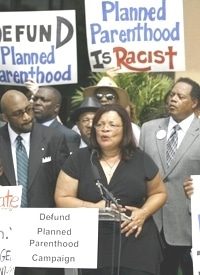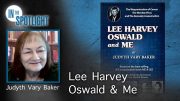
While yesterday’s liberals and today’s progressives have championed the Rev. Dr. Martin Luther King, Jr. as a hero for decades, a niece of the legendary civil rights leader says her uncle would be considered a pro-life, “social conservative” today.
“Uncle Martin sounded no different than a conservative Christian preacher does now,” Alveda King said in a statement on Friday. “He was pro-life, pro-abstinence before marriage, and based his views on the unchanging Word of the Bible,” said King. “Today, Planned Parenthood would condemn Dr. Martin Luther King, Jr. as part of the ‘religious right.’ ”
King, who is director of the African-American Outreach for Priests for Life, said her uncle, assassinated on April 4, 1968, would have been in the pro-life movement if he had lived to see the results of abortion in America since it was declared a constitutional right by the U.S. Supreme Court’s Roe v. Wade decision of January 22, 1973.
“Martin would say, ‘Injustice anywhere is a threat to justice everywhere.’ So how is it going to be just to murder somebody and rip them up and burn them with chemicals?” she said. “Dr. Martin Luther King, Jr. was a man of peace, justice, and most of all a man of God, Were he alive today, he would be working to secure peace and justice for those in the womb and healing for a nation that is still pained by over 50 million missing lives.”
King was widely criticized by some of her late uncle’s admirers for appearing as a featured speaker at conservative talk show host Glenn Beck’s “Rally to Restore Honor” in Washington last August on the anniversary of Martin Luther King’s inspiring “I Have a Dream” speech at the 1963 March on Washington. While King was honored and praised for his vision of an America where his children would be judged “not by the color of their skin but by the content of their character,” critics of the rally claimed King and his followers had little in common with Tea Party conservatives and others among the tens of thousands who gathered at the Lincoln Memorial to hear Beck, Sarah Palin, and other heroes of the political right.
In a piece titled, “The Shame of Alveda King,” Washington Post opinion writer Jonathan Capehart wrote after the “Restore Honor” rally: “Dr. King’s legacy is precious. Alveda King on Saturday besmirched it.”
“Alveda is being called a traitor for her actions and probably has old Uncle Martin turning in over in his grave,” wrote Boyce Watkins, founder of Your Black World Coalition. Civil Rights historian Professor David Garrow of the University of Cambridge, an historian of the civil rights movement in America, also found the martyred civil rights leader an odd hero to the conservative crowds attracted by Beck and Palin.
“King was not only not a Republican, he was well to the left of the Democratic Party of the 1960s,” said Garrow. “One could make a very strong case that King thought of himself as a democratic socialist. It’s also well-documented that Dr. King was a strong supporter of Planned Parenthood, and it’s well-documented that one of his five or six closest advisers, Bayard Rustin, was gay.”
There is no doubt that King, in his rhetoric and the causes he championed, had moved sharply to the left by the late 1960s, no longer campaigning only for an end to racial discrimination, but bitterly denouncing American militarism and comparing America’s role in Vietnam to the aggressions of Nazi Germany. And his calls for a redistribution of wealth would likely have gotten him booted off the stage by the Tea Party members who were cheering quotations from his “I Have a Dream” speech last August. But Alveda King points to statements her uncle wrote in an advice column for Ebony magazine in 1957-58, in which the Baptist minister replied to questions concerning disciplining of children, premarital sex and homosexuality. To a young man who was concerned over his attraction to members of his own sex, for example, King did not advise him to pursue the attraction as natural or to embrace it as an alternative lifestyle.
“The type of feeling that you have toward boys is probably not an innate tendency, but something that has been culturally acquired,” King wrote. “… You are already on the right road toward a solution, since you honestly recognize the problem and have a desire to solve it.”
Abortion had not yet become a national issue at the time of King’s death, but Alveda King insists her uncle was pro-life, despite his having received one of the first Margaret Sanger Awards from the Planned Parenthood Federation of America. Planned Parenthood has since become the largest provider of abortions in America and the award is named after the organization’s founder. King’s award was for his “courageous resistance to bigotry and his lifelong dedication to the advancement of social justice and human dignity.” His niece points out that the civil rights leader did not receive the award in person and she doubts that he actually wrote the acceptance speech that his wife, Coretta Scott King read at the awards ceremony. Coretta Scott King remained a defender of legalized abortion until her death in 2006. The speech she read for her husband at the award ceremony said, “there is a striking kinship between our movement and Margaret Sanger’s early efforts.”
“In 1966, abortion on demand was unthinkable,” Alveda King says. “To imply that Uncle Martin’s receipt of that award constitutes his endorsement of what Planned Parenthood engages in today — the destruction of human lives — is an outrage.” She also points out, in her lectures and articles, aspects of Margaret Sanger’s career that are not widely known, including her championing of eugenics to reduce, through birth control and sterilization, the numbers of those she regarded as the “unfit” members of the human race. Sanger and others planned a “Negro project” to persuade black families to have fewer children. The best way to do that, Sanger wrote, would be to persuade black ministers of the benefits of population control.
“The most successful educational approach to the Negro is through a religious appeal,” Sanger wrote. “We don’t want the word to go out that we want to exterminate the Negro population and the minister is the man who can straighten out that idea if it ever occurs to their more rebellious members.” King contends the policy is going forward today. In a documentary on Planned Parenthood that she presents at her speaking engagements, she says the “vast majority of Planned Parenthood clinics are located in our (African-American) neighborhoods.”
“Are we really so naïve to believe this is all a coincidence?” she asks. King during the past year has organized “freedom rides” to carry the message of the pro-life movement in a manner similar to the pro-integration freedom rides of the early 1960’s. It was around the time when African-Americans began marching and demonstrating for civil rights, she says, that population control advocates began calling for legalized abortion.
“Was that coincidence too,” she asks, “or could it be that when we said we would no longer sit on the back of the bus, a place was being reserved for us down at the abortion clinic?”
Some may consider that far-fetched, but if the purveyors of abortion are attempting to target the black population, they are having tremendous success, writes Steven Ertelt at LifeNews.com. Numbers from the federal Center for Disease Control show “the black abortion rate is three times that of white women and twice the rate of all other races combined,” Ertelt wrote on Friday. Billboard advertisements depicting African-American babies as an “endangered species” have been sponsored by anti-abortion groups in cities across the country, frequently causing outrage among black Americans. But Walter Hoye, a pro-life African-American pastor in California who helped sponsor the billboard ads in Los Angeles, believes the numbers confirm the message. Of 53 million infants aborted since 1973, he said, 18 million, or more than a third, were African-American. “The impact of abortion in the African-American community is the Darfur of America,” Hoye said.
Boyce Watkins, while critical of King for taking part in the Glenn Beck rally, nonetheless conceded that her conservative and pro-life views do not make her an isolated figure among African-Americans.
“Alveda King actually represents millions of church-going African Americans, ” Watkins said. “Also, her views are not nearly as outlandish as some would lead you to believe. Alveda King is opposed to gay marriage, just like my mother. She doesn’t believe in abortion, just like many members of my own family. She believes strongly in old school family values, similar to Bill Cosby. She is clearly a product of the traditional black church and represents a section of black America that liberals don’t like to talk about. Many African Americans, whether we want to admit it or not, would agree with Alveda King on nearly every single issue.”
Photo: Dr Alveda King speaks outside the Democratic National Committee (DNC) headquarters in Washington, June 26, 2008, calling for the DNC, and Republican National Committee (RNC) to refuse campaign funds from Planned Parenthood: AP Images



